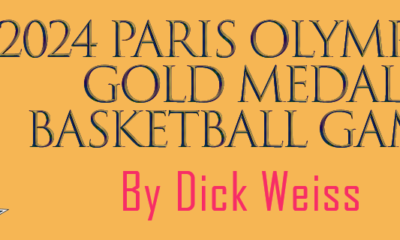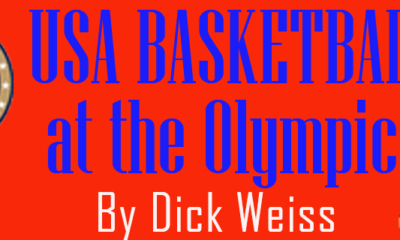SPRINGFIELD, Mass.– George Raveling has always been a pioneer.
As a young assistant at Villanova, he built a reputation as the best recruiter and talent evaluator in the country, creating his own underground raillbroad when he transported black prospects from the deep South to a better life on the Philadelphia Main Line. After helping Lefty Diresell of Maryland build a top-ranked program as the first African American assisstant in the ACC, Raveling was selected as head coach at Washington State in 1972, where he became the first African American head coach in the Pac-Eight. Raveling went on to become a highly successful coach at Iowa and the University of Southern California and later became one of the first African American corporate executives at the most influential shoe company in this country.
The 76-year-old Raveling, who is currently the Director of Nike’s Global Development, will be honored for a lifetime of achievement here this weekend when he receives the John W. Bunn award from the Naismith Hall of Fame.
He has always been a special person in the sport and deserves the respect of everybody who has had the privilege of meeting and dealing with him. Raveling will also be inducted in the College Basketball Hall of Fame in Kansas City and will receive the Joe Lapchick Character award at Madison Square Garden in November.
But Raveling had a much bigger personal moment in his life some 50 years ago when he was a 24-year old unlikely witness to history in this country’s struggle for civil rights and racial equality. On Aug. 28, 1963, Raveling was a volunteer security marshal who was on the podium during the famed “March of Washington for Jobs and Freedom” when the late Dr. Martin Luther King delivered his famed, “I have a dream” speech before a crowd of 250,000 who made the pilgrimage from the Washington Monument to the Lincoln Memorial in this nation’s capital. They came from all over, including the deep South, to demand a $2 dollar a hour minimum wage, a meaningful civil rights bill, desegregation in the schools, the passage of a law positing racial discrimination in public and private hiring and self governance i the District of Columbia, where the majority of the population was African-American.
At the end of the speech, Raveling was so moved, he walked up to Dr. King at the side of the stage. He asked for –and was handed– the lone copy of that typed speech. Raveling has been the guardian of the second most important document in American history, surpassed only by the Gettysburg Address, ever since. He has been offered as much as $3.5 million for the speech but he has no interest in selling it. “I would like to think somewhere out there my mom and dad and my grandmas taught me better than that,” he told USA Today.
The 6-8 Raveling, who was a star at Villanova and his best friend Warren Wilson, one of his college teammates, actually decided to attend the rally just one day earlier at the urging of Wilson’s father. The two drove to D.C., checked into a hotel and then walked over to the Lincoln Memorial, where they were recruited by an organzier as a volunteer security guard. Even though the rally was billed as a non-violent protest, organizers were still concerned about the potential for violence in a tense, segregated city where the D.C. police commissioner assigned two thirds of his force to the area surrounding the mall and the National Guard and the D.C. Fire Department was also called up as backups.
There was a fear among President John F. Kennedy and the federal government the event might lead to a backlash for any civil rights legislation and the fear the Klux Klux Klan and other hate groups might try to injure the attendees and precipitate a huge riot.
But Kennedy supported the march, which turned into a peaceful demonstration and a moving tribute to a movement that was organized by several civil rights organizers, including James Farmer, of the Congress of Racial Equality, Martin Luther King, Jr. of the Southern Christian Leadership Conference, John Lewis, of the Student Nonviolent Coordinating Committee (SNCC); A. Phillip Randolph of the Brotherhood of Sleeping Car Porters; Roy Wilkins, of the NAACP and Whitney Young, Jr., of the National Urban League.
The event included musical performances by Marian Anderson, Joan Baez, Bob Dylan, Mahalia Jackson, Peter, Paul and Mary; and Josh White. Charlton Heston– representing a group of artists, including Harry Belafonte, Marlon Brando, Diahann Carroll, Ossie Davis, Sammy Davis Jr., Lena Horne, Paul Newman, and Sidney Poitier—read a speech by James Baldwin.
The speakers included all of the “Big Six” civil-rights leaders (James Farmer, who was imprisoned in Louisiana at the time, had his speech read by Floyd McKissick); Catholic, Protestant, and Jewish religious leaders; and labor leader Walter Reuther. The one female speaker was Josephine Baker, who introduced several “Negro Women Fighters for Freedom,” including Rosa Parks.
King was the final speaker on the program, which by then had developed into an emotional gospel meeting.
He had used the words, “I have a dream” in four previous speeches, but he might have never spoken them that day unless he had been goaded into it by famed gospel singer Mahalia Jackson, who constantly implored him to “Tell them about the dream.”
King ad libbed the rest of his speech, not only using “I have a dream,” phase but also finishing his oratory speaking of an America where children will not be judged by the color of their skin but by the content of their character.
“When this happens, when we allow freedom to ring, when we let it ring from every village and every hamlet, from every state and every city, we will be able to speed up that day when all of God’s children, black men and white men, Jews and Gentiles, Protestants and Catholics, will be able to join hands and sing in the words of the old Negro spiritual, “Free at last, free at last. Thank God Almighty, we are free at last.”
Raveling, ironically, kept the speech in a book for 20 years without looking at it and had no idea it didn’t originally include the words, ‘I have a dream.” Eventually, he and his wife put the speech in a private safe deposit box in a Los Angeles bank for safe keeping.
Dick Weiss is a sportswriter and columnist who has covered college football and college and professional basketball for the Philadelphia Daily News and the New York Daily News. He has received the Curt Gowdy Award from the Naismith Basketball Hall of Fame and is a member of the national Sportswriters Hall of Fame. He has also co-written several books with Rick Pitino, John Calipari, Dick Vitale and authored a tribute book on Duke coach Mike Krzyzewski.









